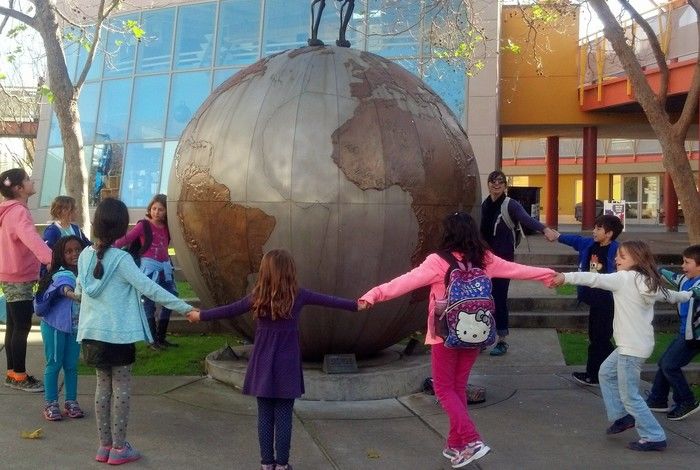Want homework help? Solid study skills? Better test scores? Here, experts offer insights to help you find the right academic programs for your kids.
By Laura Quaglio
For starters, kids everywhere can benefit from being immersed in a supportive environment where they will have their individual needs addressed and met. Just look at how much colleges “sell” their small student-teacher ratios, and you’ll see how appealing it might be for your child to be one of, say, 10 students, instead of 30 or more kids vying for a teacher’s attention.
See a list of academic classes near you > >
Find a tutor > >
Also, as parents, we know that practice equals progress. It’s why we invest in soccer camp and piano lessons. And though our kids “could” practice penalty shots and major scales on their own at home, or we “could” do that with them, chances are it’s not going to happen. And if it does, it may not be pretty.
The big difference between choosing an academic enrichment program (instead of enrolling kids in sports or the arts) is that many of us don’t know where to begin or what questions to ask. Because we know how vital our kids’ minds are, we’re afraid to foray into this area at all. Before we can sell our kids on the idea, we need to have confidence in our decision.
For some expert guidance, we turned to three experts for their insights into the different types of academic classes, camps, and tutors available to kids:
- Darrell Dela Cruz, the education coordinator of Communication Academy in Cupertino, California, whose goal is to help students develop confidence in their communication skills, which can help them be more confident and successful in all aspects of their lives
- Abby Hunt, director of brand and communications at Wyzant, the nation’s largest online market site for finding tutors and coaches for learners of all ages
- Winnie Wong, PhD, founder and director of instruction at EDNova Academy, in San Mateo, California, which aims to inspire, guide, and nurture the next generation STEM leaders and empower students with knowledge so they can choose who they want to be
Before we get to the questions you might want to ask of any academic program, let’s take a quick look at some of the main differences between tutors, camps, and classes.
Tutors, Classes, and Camps: Some Key Points
Each of these types of academic enrichment offers its own unique benefits. “If you need help in a very specific subject, you’re not always going to find a tutor right down the street,” says Hunt. The same is true of local classes or camps. That’s why Wyzant offers connections to 80,000 tutors, many of whom are willing to offer online lessons and support. Tutoring also provides a highly customized approach, allowing each child to receive the full attention of one instructor.
On the other hand, taking academic classes in a small-group setting teaches kids to work together cooperatively, to communicate as a group, and to listen to different viewpoints and ideas from different students. Classes result in steady improvement over time. “To cultivate a good habit, you have to take time,” says Dr. Wong. Classes also allow students to learn about a particular subject matter and then build upon that knowledge steadily.
Camps, though, will immerse kids in a topic, giving them a very strong foundation of knowledge, says Dela Cruz. “Kids are preparing, practicing, presenting, and receiving feedback, all within a short period of time,” he says. This provides them with tangible results quickly — and leads to the formation of strong bonds between the kids and their instructors and fellow students, since they spend so much time together for several consecutive days.
Classes generally result in steadier improvement, and kids will retain the concepts for longer because they continue to practice over time. One suggestion? If your kids take a camp and enjoy it, consider enrolling them in weekly classes or at least following up with another camp, which can serve as a refresher course so they won’t lose what they have gained.
Questions to Ask Instructors and Program Directors
When you’ve narrowed down what type of program you’d like to try, consider asking some or all of these questions to help you find a location that’s a good fit for your family.
What is your teaching philosophy?
Many after school educators share a common frustration about the school system: that it causes kids to focus on failure. “Failing is not the opposite of success,” says Dr. Wong. “It’s the way to success. If you don’t fail, you won’t learn anything and be able to improve.” Her approach is to instill a sense of curiosity into her students and give them the tools to glean information about any subject from the internet and experts in the field.
Other locations may focus on “teaching to the test” — helping kids pass or improve in a particular standardized test or in a certain topic such as a Common Core subject. If you’re looking for your child to make quantitative improvements in test scores, that may be the right avenue for you.
And different tutors — even those referred by the same service – will each have their own unique approach to sharing their knowledge, offering support, and measuring success and improvements.
Be sure you find a location and instructor whose teaching philosophy matches your parenting philosophy and academic goals. Think of it this way: If you want a good key lime pie, you’ll be happier going to a bakery that specializes in it than you would if you visited a cupcake bakery and explained your recipe for pie.
When will I see an improvement in grades and test scores?
According to Hunt, research showed that students generally see one grade improvement in the class (in grades K through 12) for 8 hours of tutoring. That means four 2-hour sessions or eight 1-hour sessions — whatever combination. And that was across all subjects. However, keep an eye out for other less-quantifiable improvements, too.
“Kids will develop their own curiosity. They will be challenged and frustrated, but they will learn how to resolve that in their own way with a lot of support. And they’ll want to learn more. Although good grades are important to maintain, it is not our main focus. We aim to assist in cultivating a learner who sees pass grades. We want our students to appreciate and value the process of learning. We believe knowledge is power. Good grade is a natural by product of proactive learning. If they cultivate their curiosity and build a strong foundation for learning, the grade will come in.”
Many establishments actually promise to raise standardized test scores or report-card grades by the session’s end. If you don’t see an improvement in any way after a few weeks, ask the instructor why. If they don’t have a response that satisfies you, consider seeking a new instructor who is a better fit.
How large are class sizes?
“The main benefit of a tutor is that one-to-one interaction with an expert,” says Hunt. Some tutors, though, might offer small-group instruction at a reduced rate. And sometimes tutoring is offered online.
Many academic classes and camps welcome slightly larger numbers, but they usually keep groups small enough for kids to enjoy the perks of both private instruction and group communication. For instance, at both EDNova Academy and Communication Academy, class sizes typically max out at 12 kids.
These student-teacher ratios mean that instructors can “learn how students think,” says Dr. Wong. Some kids will rush to finish a task and overlook important details. Others won’t take risks so they don’t challenge their limits. She tries to identify kids’ strengths and weaknesses, then help each child get their weaknesses “out of the way.” This is much easier for an instructor to do if they have a smaller number of kids in their class. Think about what you want your child to get out of the instruction and just how much one-on-one is really necessary — or whether they’ll do just fine in a bigger group.
How will you communicate with parents and schools?
“We like to talk to parents about what they’re looking for,” says Dela Cruz. For instance, if a child is in a public speaking or debate class, the parent might want the child to work on being louder or speaking more clearly. Then the instructor will keep that in mind when working with that child.
“A tutor should be communicating with the parent to create a curriculum,” says Hunt. This should be based upon what the goals are and how the child learns, whether it’s a hands-on approach, reading a text, watching videos, or a combination. Parents, too, should communicate with the instructor, she says. “Where do you think the child needs help first? If you’re not sure, ask their teachers at school. The more coordination between the teacher and parent and tutor, the better the experience will be.”
What takes place in a session, class, or camp?
For EDNova Academy students, education is project-based. For instance, for nine or 10 weeks, kids might focus on 3D printing. Not only will kids learn how to make something using this technology, they’ll immerse themselves in the subject. They will research the history of 3D printing and why it has become popular. They’ll learn what it is used for and brainstorm possible uses for it in the future. “They will learn they can print a 3D kidney or a 3D chocolate,” she says. “That kind of thing really sparks their interest in learning. They say, Let me find out more!”
Also be sure you understand the overall time commitment. The classes at Communication Academy are usually held once a week for 8, 10, or 12 weeks, while camps run Monday through Friday in two 3-hour sessions (one a.m. and one p.m.), with kids being able to opt for one or the other or to stay for both. At EDNova Academy, kids spend 3 hours per week with their after school instructor (divided into two sessions).
The best way to learn about the curriculum — per day or per session — is to go over it with the instructor. Will your child be able to raise their standardized test scores by a certain number of points after 10 weeks? Does the school expect your child to attend on a long-term basis, as they would if they were, say, taking voice lessons? Will the instructor also be doing breakout sessions in unrelated areas (such as a volleyball break during coding camp)? You and your family need to find the best fit for your time frame and end goals.
Will there be homework?
Some programs require about 30 minutes of homework per week, just to reinforce principles. Others may require some prep work, as in practicing a speech to deliver for the next class. Still others require no homework at all. For instance, kids attend Dr. Wong’s program for an hour-and-a-half twice a week, so she only gives them extra work if they request it.
Either way, Dr. Wong recommends talking to your kids about what they are learning and letting them teach you. Kids love to share what insights they have gained and surprising facts they learned, especially if these are things that their parents don’t already know! Plus, teaching will help your kids reinforce what they learned – but that can be our little secret.
What qualifications do your instructors have?
Meet with your child’s intended instructor before signing up for a course, class, workshop, or camp. Dr. Wong advises seeking a program whose owner, founder, and/or director is passionate about what they do and has significant experience in the subject matter. “I do math and science and engineering and technology because I’m a domain expert in these,” she says. “I don’t teach subjects that I don’t know.”
It’s also helpful to sit in on a class and listen to the teacher’s method of instruction. A person may have a master’s degree in a subject but not be great at conveying what they know to others – particularly young people.
Also, try to assess the person’s actual degree of expertise. “Just because someone took a few classes doesn’t mean they’re an expert,” adds Hunt. “Some people want a certified teacher. But I also think grad students are really good.”
Another tip from Hunt: “If possible, get a background check. Most tutors elect to have them, and any of our students can ask any of our tutors to get one.”
Does your program offer any other perks?
Will kids make connections in their field of interest, for example, or will they be able to compete in, say, a debate? Just as some martial arts schools go to competitions, so do some academies for math, debate, or writing, to name a few. Because of Dr. Wong’s university connections, some of her students have been able to visit expos and workshops at University of California, Berkeley. Consider which extras would be most beneficial and appealing to your child when looking for an academic program for them. But don’t get sidetracked by this. Remember your primary goals are just that: primary.
Can I attend an open house?
Once you’ve narrowed the field to a few potential candidates, the best way to choose an academic program is to pay a visit in person. Many academic programs invite families to tour their facilities, sit in on a class, meet the instructors, and gain other insights into the program. Some even hold formal “open houses” each year. This can help parents and kids get an idea of whether their child might fit well with the program and other students. (It’s also great practice for attending college open houses in the future.) If you do get to attend such an event, talk with parents and current students, as well as the staff. Find out why other families like the location, and ask which instructors they favor and why. (But keep in mind that your child’s experience may be different, even with the same educator.) If there’s not an upcoming open house at a program you’re considering, ask the director if they can set up a similar visit for you and your kids.
How can I help enhance what my child is learning?
Always remember that you are and will always be a key player in your child’s education. Trust your gut about what’s right for your child when choosing a program— and when choosing to opt out of one and try another. And above all: Be your child’s biggest proponent and cheerleader.
“I recommend not always explaining what kids did wrong,” says Dela Cruz. Schools are notorious for sending home papers marked up with what is incorrect. So children hear enough of that already. “The kids worked hard on this, they see those red marks, and they feel they have failed,” he says. What can parents do? “Look at what your child did right and tell them that first,” he advises. Then look at what they need to improve on, and treat it as that: the next logical step toward their next success.

















